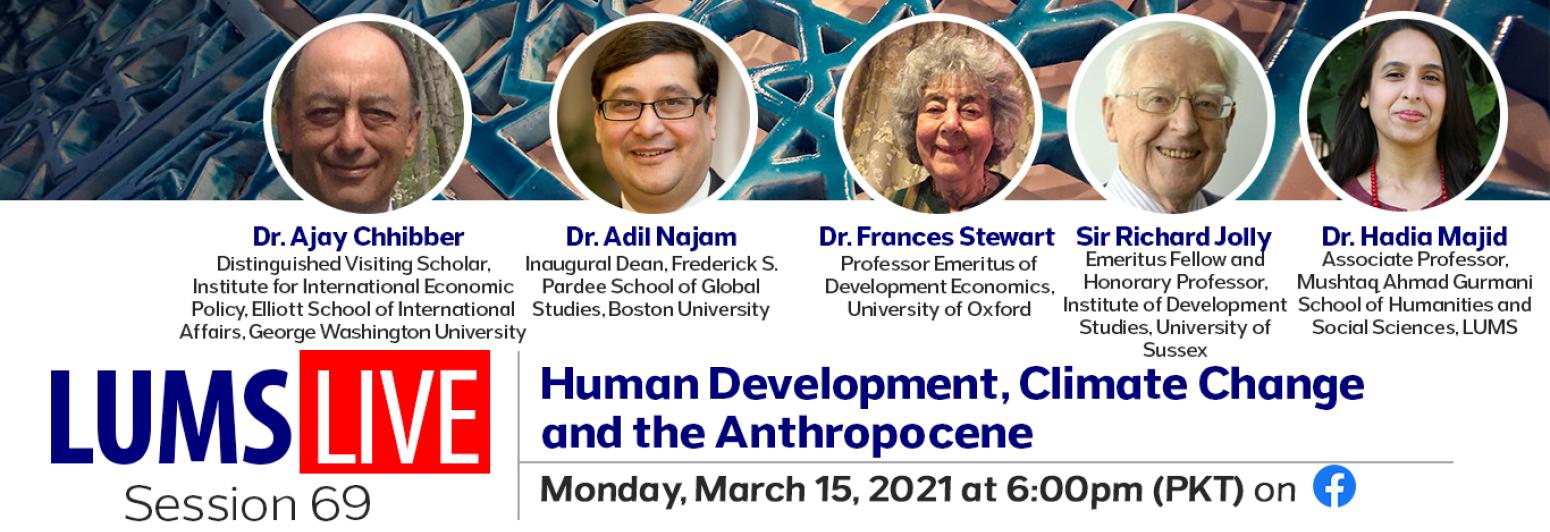
March 15, 2021 to March 15, 2020
Our esteemed panel will discuss the implications and limitations of the Planetary-pressures Adjusted Human Development Index introduced in UNDP’s 2020 Human Development Report, and will further examine the importance of climate change for how we think of and measure human development. The panel will also use these new findings to discuss policy measures, state commitments and societal actions that are needed to mitigate the human devastation of the planet.
Date: Monday, March 15, 2021
Time: 6:00 pm (PKT)
Hosted in collaboration with the Mahbub ul Haq Research Centre (MHRC), as part of their Global Challenges Webinar Series, this session will be moderated by Dr. Hadia Majid. Our distinguished panelists for this session are Dr. Ajay Chhibber, Dr. Adil Najam, Dr. Frances Stewart and Sir Richard Jolly.
Join us for this insightful conversation!
Profile of Panelists
Dr. Ajay Chhibber
Dr. Chhibber was the first Director General (Minister of State), Independent Evaluation Office, Government of India and Distinguished Visiting Professor, National Institute of Public Finance and Policy, India. He held senior positions at the UN as Assistant Secretary General and Assistant Administrator, UNDP. At The World Bank, he served as Country Director in Turkey and Vietnam. He was also Director of the 1997 World Development Report on the Role of the State. A PhD from Stanford University, Dr. Chhibber has attended advanced management programmes at the Harvard Business School and INSEAD. He has published widely, including five books in development economics and is a contributor to several newspapers.
Dr. Adil Najam
Dr. Najam is also a Professor of International Relations and of Earth and Environment, and has served as Director, Pardee Center for the Study of the Longer-Range Future, Boston University. Dr. Najam has taught at MIT and at the Fletcher School of Law and Diplomacy, Tufts University. He has also served as Vice Chancellor of LUMS. His research focuses on issues of global public policy, especially those related to global climate change, South Asia, Muslim countries, environment and development, and human development.
Dr. Frances Stewart
Dr. Stewart has served as Director, Oxford Department of International Development and Director, Centre for Research on Inequality, Human Security and Ethnicity, at the department. Her most recent book is Advancing Human Development: Theory and Practice (OUP 2018). Besides numerous publications on issues of human development, inequality and security, Dr. Stewart has acted as a consultant for many Human Development Reports including the first one in 1990. She has been President of the Human Development and Capability Association; President of the British and Irish Development Studies Association; Chair of the UN Committee on Development Policy and Vice-Chair of the Board of the International Food Policy Research Institute. She was also a member of the UNDP's Advisory Board for the 2020 HDRO.
Sir Richard Jolly
Sir Jolly has served as Assistant Secretary General of the UN, as Deputy Executive Director of UNICEF and Principal Coordinator of the UN’s Human Development Report. He chairs the HelpAge committee on the Global AgeWatch Index. From 1996-2000, he was the Special Adviser to the Administrator of UNDP and Principal Coordinator of the widely acclaimed Human Development Report, overseeing reports on a human development approach to growth, poverty, consumption, globalisation and human rights. Sir Jolly has served on the Council of the Overseas Development Institute and at UNICEF, he worked for the reduction of child mortality and the needs of children and women in the making of economic adjustment policies.
Dr. Hadia Majid
Dr. Majid is also Director of the Saida Waheed Gender Initiative at LUMS. A Fulbright scholar, she holds a PhD in Development Economics from The Ohio State University. Her research agenda considers the impact of monetary and public resource constraints on individuals in Pakistan. Her work includes cash transfer evaluations, public goods provisioning, human capital acquisition in the context of intra-household decision-making, and factors affecting women’s access to earned income. She also documents and explores the barriers to women’s labour supply and their access to decent, empowering work with a special emphasis on the role of household bargaining structures in mediating women’s access to work. Her expertise lies in RCT, quasi-experimental, and quantitative driven fieldwork.



















